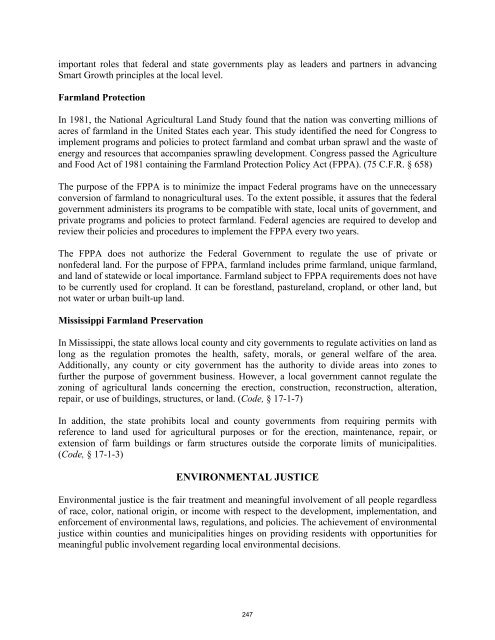in Mississippi
m2078-county-gov-ms
m2078-county-gov-ms
You also want an ePaper? Increase the reach of your titles
YUMPU automatically turns print PDFs into web optimized ePapers that Google loves.
important roles that federal and state governments play as leaders and partners <strong>in</strong> advanc<strong>in</strong>g<br />
Smart Growth pr<strong>in</strong>ciples at the local level.<br />
Farmland Protection<br />
In 1981, the National Agricultural Land Study found that the nation was convert<strong>in</strong>g millions of<br />
acres of farmland <strong>in</strong> the United States each year. This study identified the need for Congress to<br />
implement programs and policies to protect farmland and combat urban sprawl and the waste of<br />
energy and resources that accompanies sprawl<strong>in</strong>g development. Congress passed the Agriculture<br />
and Food Act of 1981 conta<strong>in</strong><strong>in</strong>g the Farmland Protection Policy Act (FPPA). (75 C.F.R. § 658)<br />
The purpose of the FPPA is to m<strong>in</strong>imize the impact Federal programs have on the unnecessary<br />
conversion of farmland to nonagricultural uses. To the extent possible, it assures that the federal<br />
government adm<strong>in</strong>isters its programs to be compatible with state, local units of government, and<br />
private programs and policies to protect farmland. Federal agencies are required to develop and<br />
review their policies and procedures to implement the FPPA every two years.<br />
The FPPA does not authorize the Federal Government to regulate the use of private or<br />
nonfederal land. For the purpose of FPPA, farmland <strong>in</strong>cludes prime farmland, unique farmland,<br />
and land of statewide or local importance. Farmland subject to FPPA requirements does not have<br />
to be currently used for cropland. It can be forestland, pastureland, cropland, or other land, but<br />
not water or urban built-up land.<br />
<strong>Mississippi</strong> Farmland Preservation<br />
In <strong>Mississippi</strong>, the state allows local county and city governments to regulate activities on land as<br />
long as the regulation promotes the health, safety, morals, or general welfare of the area.<br />
Additionally, any county or city government has the authority to divide areas <strong>in</strong>to zones to<br />
further the purpose of government bus<strong>in</strong>ess. However, a local government cannot regulate the<br />
zon<strong>in</strong>g of agricultural lands concern<strong>in</strong>g the erection, construction, reconstruction, alteration,<br />
repair, or use of build<strong>in</strong>gs, structures, or land. (Code, § 17-1-7)<br />
In addition, the state prohibits local and county governments from requir<strong>in</strong>g permits with<br />
reference to land used for agricultural purposes or for the erection, ma<strong>in</strong>tenance, repair, or<br />
extension of farm build<strong>in</strong>gs or farm structures outside the corporate limits of municipalities.<br />
(Code, § 17-1-3)<br />
ENVIRONMENTAL JUSTICE<br />
Environmental justice is the fair treatment and mean<strong>in</strong>gful <strong>in</strong>volvement of all people regardless<br />
of race, color, national orig<strong>in</strong>, or <strong>in</strong>come with respect to the development, implementation, and<br />
enforcement of environmental laws, regulations, and policies. The achievement of environmental<br />
justice with<strong>in</strong> counties and municipalities h<strong>in</strong>ges on provid<strong>in</strong>g residents with opportunities for<br />
mean<strong>in</strong>gful public <strong>in</strong>volvement regard<strong>in</strong>g local environmental decisions.<br />
247


